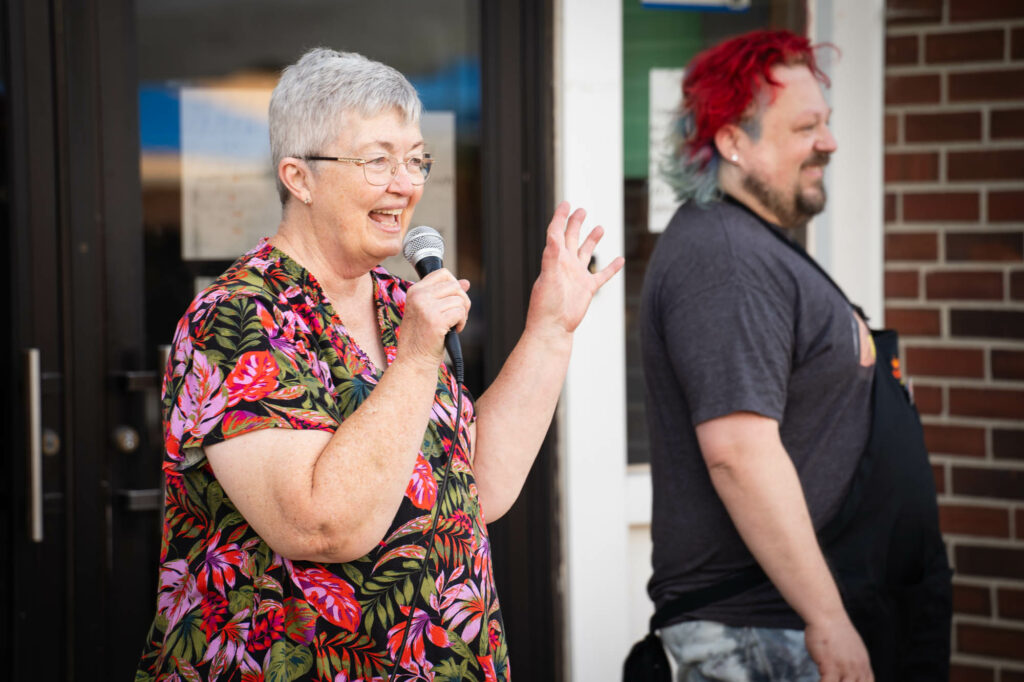Loretta Parsons’s story as told to Suzanne Clem

If you volunteer long enough . . .
. . . then you might find yourself the director of a soup kitchen one day. Before I’d ever spent a day in the Soup Kitchen of Muncie, which was known as Harvest Soup Kitchen back then, I was part of a group at my church looking for ways to serve others. How could we help our friends and neighbors? Those experiencing homelessness or mental illness, or who were simply in a hard phase of life? We landed on preparing and serving a Sunday meal at the Soup Kitchen. This was around 2006, before I knew anything about food insecurity or food deserts. When a cook at the kitchen left, I stepped in to take on that role. Then when the director resigned in 2011, the Board asked if I’d consider the lead role, and that’s what I’ve been doing ever since. Back when I was volunteering, we’d consider seventy-five guests to be a really busy day. Little did I know I’d see that nearly double over time.
If your community loses five grocery stores . . .
. . . then there will be people who can’t get groceries, plain and simple. In July of 2017, Muncie lost five Marsh grocery stores. To put it plainly, I was furious. While two on the north and west ends of town were replaced eventually with Payless groceries, the other three remained vacant, or were bought to become other businesses, like storage. Storage unfortunately does not feed families. The three unreplaced stores were in what I’d consider food deserts. These were also areas where many of our under-resourced community members live, often without cars. People told me what used to be a walk to the grocery store, sometimes daily, was now a stressful bus trip that might take the better part of the day: getting to the bus stop, waiting for the bus, wrangling kids and strollers onto a bus (and then again at a transfer), and then managing multiple grocery bags because you know you can’t easily get to the store soon again any time soon, so you better get as much as you can in that trip. Maybe Dollar General is closer so you now walk there for groceries, and fresh produce stops finding its way onto your table. Maybe you just go without. That July, for several days straight, the Soup Kitchen went from serving about one-hundred-and-twenty-five guests daily to more than two-hundred. I don’t know how on earth we did it, but we did.
If we create spaces where people can come into relationship with each other . . .
. . . then we share in each other’s losses. Years ago, a regular guest who dealt with alcohol addiction lost his life to it. Other guests asked if we could hold a small memorial service for him. So, we gathered in the dining room. We set up a few pictures of him. We remembered how he would do anything to help someone. I don’t think there was a formal service for him anywhere else. We’d come to know him together, and we grieved his loss together.
If we create spaces where people can come into relationships with each other . . .
. . . then we also share in each other’s wins. One guest used to show up regularly with kids and stroller in tow. Then he landed a job, and eventually he stopped coming to meals. When I’d see him at that job while I was out shopping, he’d give me a big wave. A thrilled wave. You know, sometimes knowing you have a hot meal ready for you in the kitchen frees up time and energy to think about other things, to do other things—like preparing for a job interview. We celebrate those wins together.
If a community rallies together . . .
. . . then we can do big things in hard times. Covid-19 hit just before the Soup Kitchen was slated to hold our annual fundraising event. We had to cancel the event, and as you can imagine, we’re wondering how we’ll be able to do what we need to do if we can’t fundraise. But there were glimmers of hope: we offered our event sponsors the opportunity to receive a refund since we could not hold the event, and all but one sponsor wanted the Soup Kitchen to keep the funds. Even though many people were hit hard financially by Covid, it was a time to reflect on how we could keep each other afloat. With the community’s support, we were able to continue serving at the Soup Kitchen by providing cold sack meals to-go, prepared by volunteers who staggered their time in our building to help create safety through distancing. We’re so glad to be back to sit-down meals where people can fellowship—where our guests have a chance to take a breath while they share a meal with friends.
If you can dream big things . . .
. . . then you know what you’re working toward, even if it feels impossible. My vision for the Soup Kitchen is that one day it wouldn’t be needed—that years from now, everyone will have food to eat every day, without worrying where it will come from. I know that’s unrealistic, but whether everyone likes it or not, we are responsible for taking care of our brothers and sisters, our neighbors. The Soup Kitchen is dreaming big by creating a five-year strategic plan that includes broadening services beyond meals. We want to become a space where people can find services to help with all types of needs.
If we pay attention to details that make a difference, like calling the folks we serve “guests” . . .
. . . then we recognize each person’s dignity. If we see folks who need a hand up are more similar to others than they are different, then it helps us empathize. If we realize many of our friends, neighbors, and even our own families may be one unexpected expense away from having trouble putting food on the table, it helps us understand that narratives of “lazy” and “not wanting to work” are stereotypes, versus stories. And we’re here to be part of people’s stories—to help them know their value throughout the whole story, no matter which chapter they’re in when they sit down as our guest.
This story originally appeared in Facing Resource Insecurity, a publication of The Facing Project that was organized by Second Harvest Food Bank of East-Central Indiana.


